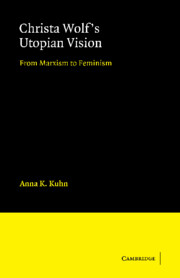Book contents
- Frontmatter
- Contents
- Acknowledgments
- List of abbreviations
- 1 Introduction: setting the context
- 2 Beginnings: experimentation with Socialist Realist paradigms
- 3 Christa T.: the quest for self-actualization
- 4 Patterns of Childhood: the confrontation with the self
- 5 No Place on Earth: revision of the Romantic heritage
- 6 Cassandra: myth, matriarchy, and the canon
- 7 In lieu of a conclusion. Störfall: the destruction of utopia?
- Notes
- Bibliography
- Index
6 - Cassandra: myth, matriarchy, and the canon
Published online by Cambridge University Press: 18 September 2009
- Frontmatter
- Contents
- Acknowledgments
- List of abbreviations
- 1 Introduction: setting the context
- 2 Beginnings: experimentation with Socialist Realist paradigms
- 3 Christa T.: the quest for self-actualization
- 4 Patterns of Childhood: the confrontation with the self
- 5 No Place on Earth: revision of the Romantic heritage
- 6 Cassandra: myth, matriarchy, and the canon
- 7 In lieu of a conclusion. Störfall: the destruction of utopia?
- Notes
- Bibliography
- Index
Summary
Re-vision – the act of looking back, of seeing with fresh eyes, of entering an old text from a new critical direction – is for us more than a chapter in cultural history: it is an act of survival. Until we can understand the assumptions in which we are drenched we cannot know ourselves. And this drive to self-knowledge, for woman, is more than a search for identity: it is part of her refusal of the self-destructiveness of male-dominated society. A radical critique of literature, feminist in its impulse, would take the work first of all as a clue to how we live, how we have been living, how we have been led to imagine ourselves, how our language has trapped as well as liberated us; and how we can begin to see – and therefore live – afresh … We need to know the writing of the past, and to know it differently than we have ever known it; not to pass on a tradition but to break its hold over us.
Adrienne RichIn her Cassandra project of 1983, Christa Wolf undertakes the radical feminist critique of literature and society described by Adrienne Rich, in a re-vision of the myth of Cassandra. Her narrative and her critique of the Western literary tradition in “Conditions of a Narrative,” the four essays that accompany the literary text, are important contributions to a female aesthetic of resistance.
- Type
- Chapter
- Information
- Christa Wolf's Utopian VisionFrom Marxism to Feminism, pp. 178 - 209Publisher: Cambridge University PressPrint publication year: 1988

